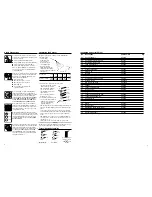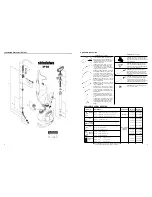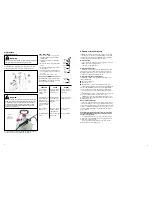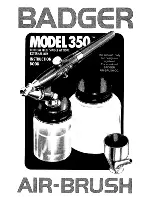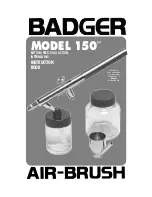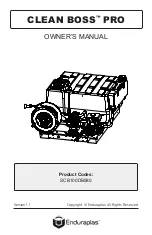
2
7
3. Attach the flow calibrator bottle to the wand:
a. Remove the nozzle, cap and
filter from the spray wand.
b. Mount the flow calibrator
cover to the spray wand.
c. Reinstall the nozzle, filter
and nozzle cap.
d. Screw the flow calibrator
bottle into the cover.
4. Using the flow calibrator bottle:
a. Operate the pump handle to
maintain spray system pres-
sure as you would when
applying chemicals.
b. Hold the wand at your normal working position and spray
into the bottle while walking the distance identified in step 2
above.
c. Place the bottle on a level surface and observe the liquid
level visible through the side of the bottle. Match the liquid
level to the l/acre (liter per acre) scale on the calibration
bottle.
d. Multiply the l/acre (liter per acre) reading identified in
step 4-c by .264 to determine your application coverage rate
in gallons per acre.
e. Empty the bottle contents back into the sprayer tank.
NOTE:
For improved accuracy in calibrating your application coverage,
repeat steps 4-a through 4-e and average the results.
1. Hold the wand
at the working
height and spray
a test pattern to
measure the appli-
cation band width.
2. Based on the band
width, identify from the
table below the walking
distance required to calibrate
the sprayer.
Carefully read the labels on chemical contain-
ers prior to use. Chemicals are classified in four
categories of toxicity:
■
Category I, High Toxicity, Red label
■
Category II, Moderate Toxicity, Yellow label
■
Category III, Low Toxicity, Blue label
■
Category IV, Light Toxicity, Green label
There are unique handling recommendations
for each category, and you should familiarize
yourself with them.
Always wear clothing and safety equipment that
will provide appropriate protection against the
materials you are handling. Equipment may
include, but not be limited to:
■
Long sleeve shirt
■
Impermeable apron or coverall
■
Impermeable gloves and boots
■
Wide-brim hat
■
Protective mask equipped with
appropriate filters
Do not eat, drink, or smoke while handling
chemicals or while you are spraying. Always
handle chemicals in a well ventilated area while
wearing appropriate protective clothing and
safety equipment. DO NOT STORE OR TRANS-
PORT CHEMICALS WITH FOOD OR MEDI-
CINES, AND NEVER REUSE A CHEMICAL
CONTAINER FOR ANY OTHER PURPOSE.
Keep chemicals out of the reach of children,
animals, or other unauthorized people. When
not in use, store chemicals in a safe place. Never
blow through nozzles, valve, pipes or any other
component by mouth!
When handling chemicals and when spraying,
make sure you are operating in accordance with
local, state, and federal environmental protection
rules and guidelines. Do not spray in very hot
or windy conditions. DO NOT POLLUTE THE
ENVIRONMENT!
After spray application, take a thoroughly cleans-
ing shower using plenty of water and soap, then
change into clean clothes. Protective clothing
and safety gear should also be cleaned after each
use. IN CASE OF EXPOSURE TO DANGER-
OUS CHEMICALS, seek a physician immedi-
ately and be prepared to provide the label from
the chemical container.
AIR
WATER
EARTH
Cover
Filter
Nozzle
Calibrator
Bottle
Band width
1.6 ft
2.3 ft
3.3 ft
4.0 ft
5.0 ft
0.5m
0.7m
1.0m
1.2m
1.5m
Distance to walk
165 ft 120 ft
80 ft
70 ft
55 ft
50.0m 35.7m 25.0m 20.8m
Calibrating the Sprayer
Safety Precautions
Nozzle
Cap
Tip
Filter
Swirl Core
Disc
Filter
Tip
The spraying angle is
changed by turning
the tip
Cap
Cap
Adjustable Cone
Nozzle
Cone Nozzle
Flat Fan Nozzle
Typical Nozzle Assemblies
(Requires optional flow calibrator bottle, P/N 646901)
Wand
Illustrated Parts List (SP150)
No. Description
Part Number
Qty.
02
Strap Assembly
925198
1
03
Strap 1800mm
901018
1
04
Shoulder Protector SP-150
917477
1
05
Shoulder Strap Buckle
502757
2
06
Tank Lid Assembly
922550
1
07
O-Ring, Tank Lid
8000778
1
08
Diaphragm Valve (viton)
964270
1
10
Cylinder Assembly
285262
1
11
Piston Cup
285270
1
12
Bushing
285288
2
13
Cylinder Cap
285296
1
14
Pumping Handle
N/A
1
15
Pumping Handle Assembly
285312
1
16
O-ring ORI-110
8000236
1
17
Dip Tube With Hose
9012246
1
18
Screw Cap S-20
942193
1
19
Trigger
568972
1
20
Trigger Valve Handle
909192
1
21
Hose Ferrule
920470
1
22
Trigger Valve Body
909283
1
23
Trigger Valve Needle Assembly
105239
1
24
Trigger Valve Cap With Seal
996058
1
25
Trigger Valve Assembly
568782
1
26
Cone Packing
909309
2
27
Screw Cap
915744
2
28
Tube
336263
1
29
Elbow
635276
1
30
Nozzle Filter
592139
1
35
Ajustable Cone Nozzle (Red)
015024
1
36
Extension Assembly
568873
1
37
Spray Wand Assembly
568774
1
38
Seal Kit (Optional)
927850
1
Summary of Contents for 80898
Page 2: ......


